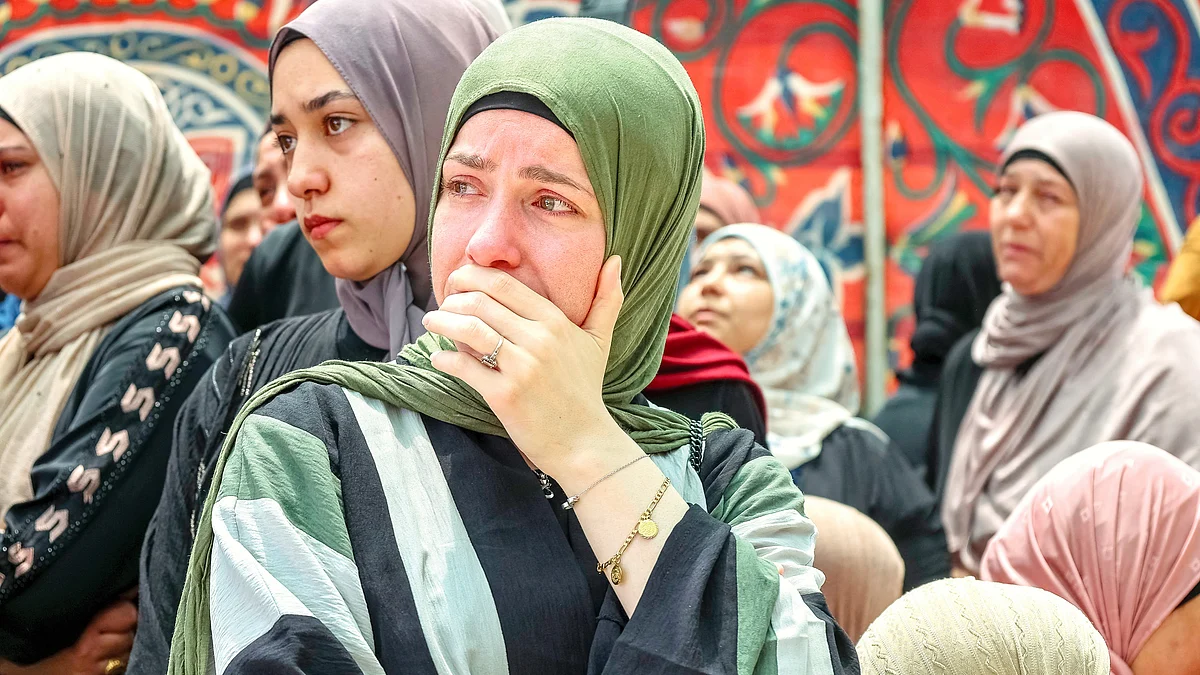Opinion
Gaza’s ‘humanitarian’ concentration camp
The planned corralling of Palestinians fits a broader vision of Gaza promoted by hardline figures within the Israeli government

Irony just died a thousand deaths. Or is it 60,000? After 22 months of an utterly remorseless slaughter of Palestinians, the Israeli government of Benjamin Netanyahu has found a new way to rub in the fact of its impunity. On the ruins of Rafah in southern Gaza, there is now a plan to create, hold your breath, ‘a humanitarian city’ for Palestinians.
According to defence minister Israel Katz, the ‘city’ will initially accommodate 600,000 displaced Palestinians from al-Mawasi — a coastal area in southern Gaza, located between the cities of Rafah and Khan Younis, where these people are currently crammed — before expanding to accommodate the entire two-million-plus population of the Gaza Strip.
Once inside, residents will be subjected to security checks and confined to the zone, their access to the outside world completely cut off. The Israeli military will guard the perimeter. How ‘humanitarian’ does this militarised enclosure sound? Or is it a plan to displace, imprison and ultimately erase the population?
Concentrated in this area, the daily survival of inmates will depend on limited aid, and their future lie in the hands of foreign powers who have neither agreed to host them nor endorsed the plan. No international organisation has accepted the role of administering this site, despite
Israeli claims that such a body will oversee the city. The Israeli military, though supposedly not managing it directly, will retain full control.
These are copybook techniques of authoritarian repression: isolate the targeted group, destroy its infrastructure, then relocate and contain. The residents of Gaza have already endured relentless bombardment, displacement and deprivation. Now, they are to be rounded up and forced into a camp built on the rubble of Rafah.
Published: undefined
There is also no ambiguity about the objective. Israel is not concealing its intention to ‘encourage’ Palestinians to leave Gaza. Katz has stated this consistently, though again in similarly misleading euphemisms like ‘voluntary emigration’. People who have been bombed out of their homes, starved, denied medicine, and offered no path to return are not emigrating by choice. They are being expelled by force.
Even Israeli leaders are alarmed. Leader of the Opposition Yair Lapid of the centrist Yesh Atid party described the plan as “dangerous”. Ehud Olmert, a former prime minister, said the planned zone was a “concentration camp” and warned that the forced movement of Palestinians into such a zone would amount to ethnic cleansing. In Israel, where analogies to such historical horrors are rare and controversial, this statement cannot be dismissed lightly.
The planned corralling of Palestinians fits a broader vision of Gaza promoted by hardline figures within the Israeli government and their international allies. Israeli policymakers are not waiting for diplomatic solutions or international support. They are moving unilaterally to shape the facts on the ground, even if doing so violates international law.
International legal standards are clear. The forced transfer of populations under occupation is a grave breach of the Geneva Conventions. So is deportation. These are not technical violations; they are crimes with long histories and devastating consequences. When done on a mass scale, they qualify as crimes against humanity. The planned ‘humanitarian city’ in Rafah falls squarely in this category.
No credible justification has been offered for why such a measure is necessary. Israel claims the area will serve as a temporary safe zone. But its own statements undermine that claim. There are no provisions for return. There are no plans to rebuild destroyed neighbourhoods or allow families to reclaim their land.
Instead, the Israeli government is working to have third countries accept Gazan refugees. These are not policies of protection — they are steps in a process of permanent removal.
Published: undefined
The ‘humanitarian city’, if built, will resemble a militarised camp, a space where two million people will be held under military watch — and gradually pushed out. It won’t have infrastructure for long-term habitation — no schools, clinics, jobs or transportation. Because the goal is not resettlement within Gaza but to eliminate Palestinian presence from it.
The displacement of Palestinians has been central to Israeli policy since the founding of the state in 1948. What is different now is the scale and the boldness of the plan. The current Israeli leadership, heavily influenced by its far-right coalition partners, is turbocharging the process. The ‘humanitarian city’, in this scheme, is only an intermediate step — before mass deportation. This is how ethnic cleansing occurs: not through a single event, but through a sequence of deliberate, escalating moves.
About 60,000 people have already been killed in Gaza since the start of the current war. Entire neighbourhoods have been wiped out. Hospitals, schools and homes lie in ruins. And now, the survivors are to be corralled into a fenced compound with no exit, dependent on foreign aid, and stripped of all rights.
The consequences of implementing such a plan will be catastrophic, not just for Palestinians but for the norms of international conduct. Allowing a State to create a population transfer scheme under the banner of humanitarianism undermines the entire legal framework built after the horrors of the two World Wars. It will normalise tactics that were once condemned across the political spectrum. And send a dangerous message: those with military power can forcibly redraw demographic and political maps without accountability.
History has shown where these paths lead. Ghettoisation, internment and mass displacement are not merely violations, they are precursors to deeper and more permanent forms of violence.
Ashok Swain is a professor of peace and conflict research at Uppsala University, Sweden. More of his writing may be read here
Published: undefined
Follow us on: Facebook, Twitter, Google News, Instagram
Join our official telegram channel (@nationalherald) and stay updated with the latest headlines
Published: undefined